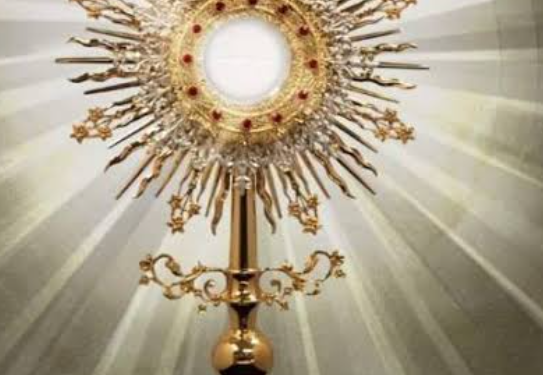Valentine Obienyem
One of our bishops once shared a story with us. At the time, he had not yet been ordained a bishop. A man came to him, requesting that he bless some water. During the exchange, the man – perhaps without realising the gravity of his words – said that he had run out of holy water blessed by a particular priest, and that the water this other priest was about to bless would serve merely as an emergency supply until he could once again obtain water blessed by that particular priest.
This story reveals a troubling mentality: a subtle but dangerous belief that the efficacy of a sacrament or sacramental depends on the personal holiness or “spiritual power” of the minister. Such thinking borders on an ancient and condemned heresy – Donatism.
A few months ago, the Bishop of Nsukka, Most Rev. Godfrey Igwebuike Onah, made a deeply reflective statement concerning the spectacle of people falling down when the Blessed Sacrament is elevated. Rather than reflecting on the pastoral and theological substance of his words, some rushed to criticise him – some with virulence, and, regrettably, some from within the ranks of the priesthood.
Have we not observed a pattern? When the same ritual that prompts this “falling down” is repeated, it is often the same individuals who fall. Should they attend another church with similar practices, the same thing happens. But more curiously, why do we hardly see those considered to be wealthy or socially influential among us fall down in these moments? Should that not be a cause for concern?
It is this pattern, among other things, that Bishop Onah’s remarks likely intended to question – not the Real Presence of Christ in the Eucharist, but the emerging theatrics surrounding it.
Unfortunately, some priests have publicly criticised the bishop, implying – either directly or by inference – that his observations diminish the power of the Eucharist. Nothing could be further from the truth. What these critics are flirting with is disturbingly close to the Donatist heresy, an error from the fourth century that held that the validity of the sacraments depends on the moral purity of the priest administering them.
This heresy, led by Donatus Magnus and his followers in North Africa, was strongly condemned by the Church, most notably at the Council of Arles in 314 A.D. St. Augustine of Hippo, writing against the Donatists, insisted that sacraments derive their power “ex opere operato” – that is, by the very fact of the action being performed – not “ex opere operantis”, or from the personal holiness of the minister. In other words, the Eucharist remains the Body and Blood of Christ, regardless of whether it is elevated by a saintly priest or one struggling in sin. To deny this is to reopen ancient wounds and sow confusion among the faithful.
In the Catholic Church, the Blessed Sacrament is approached with the utmost reverence. It is not a moment for display or emotional frenzy. Silence, adoration, and deep interior recollection are the proper dispositions. These are the moments when God often speaks in the stillness of hearts, not in the noise of spectacle.
It is truly disheartening that Bishop Onah – who, like his brother bishops, is distinguished by his scholarship, pastoral wisdom, and fidelity to the Church – has come under such public attack, especially from a handful of priests. The question must be asked: would these same priests dare to attack their own diocesan bishops with such boldness? Even more disturbing is that some of these criticisms have come from senior clerics. What are they teaching the younger clergy – those who look to them for example and guidance?
Criticism within the Church is not forbidden, but it must always be offered with humility, charity, and ecclesial loyalty. Public ridicule of a bishop, especially when rooted in misunderstanding or doctrinal confusion, does not serve the Body of Christ – it harms it.
I must confess: so sensitive is this matter, and so deep is my love for the Church, that I felt obliged to send this reflection to a trusted priest-friend for his imprimatur before making it public. I would rather remain silent than say anything that could be construed as undermining the unity or sanctity of the Church I cherish.
Let us return to sound theology. Let us recall the ancient wisdom of the Church: that Christ, not the personal charisma or sanctity of the priest, makes the sacrament efficacious. The Eucharist lifted by any validly ordained priest, holy or struggling (faithless), is the same Eucharist: the Body, Blood, Soul, and Divinity of our Lord.
As mother and teacher (mater et magistra), the Church has the task of discerning and promoting teachings and practices that are faithful to the truth of revelation and tradition. She also has the unenviable task of correcting errors, even if what is condemned is fashionable and appears to bring people to the Church. It must not be forgotten that the evil one can disguise itself as an angel of light (2 Cor 11:14).
It is important to remember that God can work miracles with anyone – even those who only use God’s name for their own purposes (Matt 7:22). Every Christian, including ministers, is only an instrument in God’s hand. God does with each and through each person what God wills. This is irrespective of one’s state of holiness or intelligence.
One should, however, strive to be attentive to God by cultivating the assistance of the Holy Spirit, whose fruits (Gal 5:22) exclude pride and self-projection.
Finally, we must also remember that Jesus promised the assistance of the Holy Spirit to the apostles and their successors – the bishops – as teachers of the truth of the faith.
May we uphold our bishops in prayer, especially those who speak difficult truths in a time when emotionalism often masquerades as piety. And may we never lose sight of the reverence and mystery that the Blessed Sacrament truly deserves.









